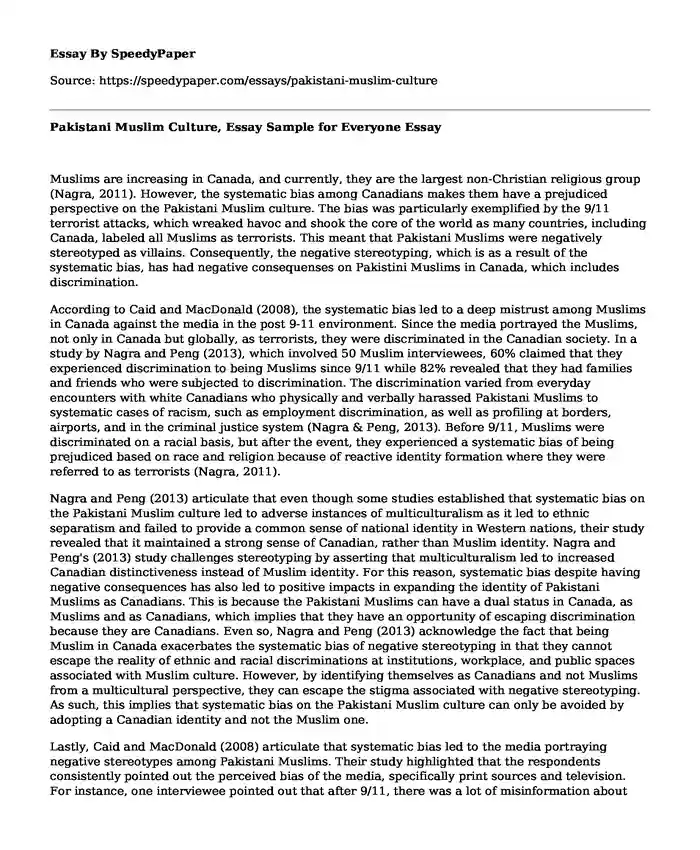
| Type of paper: | Creative writing |
| Categories: | Culture Muslim Islamophobia |
| Pages: | 3 |
| Wordcount: | 714 words |
Muslims are increasing in Canada, and currently, they are the largest non-Christian religious group (Nagra, 2011). However, the systematic bias among Canadians makes them have a prejudiced perspective on the Pakistani Muslim culture. The bias was particularly exemplified by the 9/11 terrorist attacks, which wreaked havoc and shook the core of the world as many countries, including Canada, labeled all Muslims as terrorists. This meant that Pakistani Muslims were negatively stereotyped as villains. Consequently, the negative stereotyping, which is as a result of the systematic bias, has had negative consequenses on Pakistini Muslims in Canada, which includes discrimination.
According to Caid and MacDonald (2008), the systematic bias led to a deep mistrust among Muslims in Canada against the media in the post 9-11 environment. Since the media portrayed the Muslims, not only in Canada but globally, as terrorists, they were discriminated in the Canadian society. In a study by Nagra and Peng (2013), which involved 50 Muslim interviewees, 60% claimed that they experienced discrimination to being Muslims since 9/11 while 82% revealed that they had families and friends who were subjected to discrimination. The discrimination varied from everyday encounters with white Canadians who physically and verbally harassed Pakistani Muslims to systematic cases of racism, such as employment discrimination, as well as profiling at borders, airports, and in the criminal justice system (Nagra & Peng, 2013). Before 9/11, Muslims were discriminated on a racial basis, but after the event, they experienced a systematic bias of being prejudiced based on race and religion because of reactive identity formation where they were referred to as terrorists (Nagra, 2011).
Nagra and Peng (2013) articulate that even though some studies established that systematic bias on the Pakistani Muslim culture led to adverse instances of multiculturalism as it led to ethnic separatism and failed to provide a common sense of national identity in Western nations, their study revealed that it maintained a strong sense of Canadian, rather than Muslim identity. Nagra and Peng's (2013) study challenges stereotyping by asserting that multiculturalism led to increased Canadian distinctiveness instead of Muslim identity. For this reason, systematic bias despite having negative consequences has also led to positive impacts in expanding the identity of Pakistani Muslims as Canadians. This is because the Pakistani Muslims can have a dual status in Canada, as Muslims and as Canadians, which implies that they have an opportunity of escaping discrimination because they are Canadians. Even so, Nagra and Peng (2013) acknowledge the fact that being Muslim in Canada exacerbates the systematic bias of negative stereotyping in that they cannot escape the reality of ethnic and racial discriminations at institutions, workplace, and public spaces associated with Muslim culture. However, by identifying themselves as Canadians and not Muslims from a multicultural perspective, they can escape the stigma associated with negative stereotyping. As such, this implies that systematic bias on the Pakistani Muslim culture can only be avoided by adopting a Canadian identity and not the Muslim one.
Lastly, Caid and MacDonald (2008) articulate that systematic bias led to the media portraying negative stereotypes among Pakistani Muslims. Their study highlighted that the respondents consistently pointed out the perceived bias of the media, specifically print sources and television. For instance, one interviewee pointed out that after 9/11, there was a lot of misinformation about Islamic culture as when one searched about Islamic sites, there was a lot of anti-Islamic websites. In effect, this changes the perspective of how one views Muslims, especially if they do not know anything about Islam. Caid and MacDonald (2008) challenge negative stereotypes by asserting that the media should be careful to eliminate these biases as every Muslim or Pakistani is not a terrorist or a villain to the Canadian society. As such, the systematic bias on Pakistani Muslims impacts the justice system by increasing the chances that they may be subjected to unfair treatment, such as labeling them as terrorists before being proven guilty. In conclusion, it is vital that Canadians should do away with the negative rhetoric of Pakistani Muslim culture, which will promote multiculturalism.
References
Caidi, N., & MacDonald, S. (2008). Information practices of Canadian Muslims post 9/11. Government Information Quarterly, 25(3), 348-378.
Nagra, B. (2011). 'Our faith was also hijacked by those people': Reclaiming Muslim identity in Canada in a post-9/11 era. Journal of ethnic and migration studies, 37(3), 425-441.
Nagra, B., & Peng, I. (2013). Has multiculturalism really failed? A Canadian Muslim perspective. Religions, 4(4), 603-620.
Cite this page
Pakistani Muslim Culture, Essay Sample for Everyone. (2022, Apr 11). Retrieved from https://speedypaper.net/essays/pakistani-muslim-culture
Request Removal
If you are the original author of this essay and no longer wish to have it published on the SpeedyPaper website, please click below to request its removal:
- Staffing an Intrapreneurship Plan, Business Essay Sample
- Essay Example on the Impact of Social Media
- Essay Sample on Personal and Medical History
- Free Essay Example on Death Penalties
- Free Essay Comprising the Analysis of the Vegetarian by Han Kang
- Essay Example - Description of the Video
- Free Essay. the Importance of Health Maintenance, Screening, and Management of Hypertension
Popular categories




